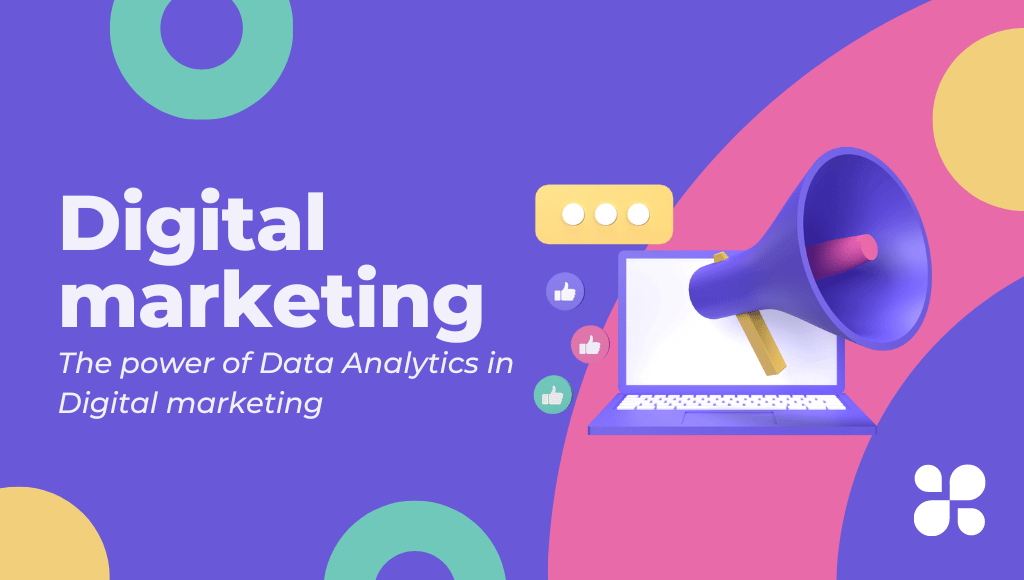The Power of Data Analytics in Digital marketing

In contemporary marketing landscapes, data analytics stands as a cornerstone of digital marketing strategies. The proliferation of digital platforms has ushered in an era abundant in data, furnishing marketers with unprecedented insights into consumer behaviors, inclinations, and trends. Harnessing the power of data analytics not only empowers marketers to make informed decisions but also facilitates the creation of highly targeted and personalized campaigns that resonate deeply with their audience. This article delves into the profound impact of data analytics on digital marketing strategies, elucidating its pivotal role in augmenting campaign effectiveness, optimizing marketing returns on investment (ROI), and propelling business expansion.
Understanding the Significance of Data Analytics in Digital Marketing:
Data analytics entails the process of collecting, analyzing, and interpreting data to extract actionable insights. Within the domain of digital marketing, it encompasses the utilization of diverse data sources, including website analytics, social media metrics, customer interactions, and demographic information, to comprehend consumer behaviors and preferences. By harnessing data analytics, marketers can glean invaluable insights into their target audience, encompassing their interests, purchasing habits, browsing patterns, and engagement inclinations A pivotal advantage of data analytics in digital marketing lies in its capacity to inform strategic decision-making. Through the analysis of data from myriad sources, marketers can discern emerging trends, prognosticate consumer behaviors, and anticipate shifts within the market landscape. This empowers them to tailor their marketing strategies accordingly, ensuring relevance and efficacy amidst the dynamic digital milieu.
Furthermore, data analytics empowers marketers to meticulously measure the performance of their campaigns. Leveraging advanced analytics tools and methodologies, they can track key metrics such as website traffic, conversion rates, click-through rates, and customer engagement levels. By monitoring these metrics in real-time, marketers can assess the impact of their marketing endeavors and effectuate timely adjustments to optimize performance.
Personalization and Targeting:
A paramount application of data analytics in digital marketing is personalization. By harnessing data insights, marketers can craft highly targeted and personalized campaigns that resonate with individual consumers. Personalization facilitates the delivery of pertinent content and offers based on a consumer’s preferences, interests, and past interactions with the brand. For instance, an e-commerce entity can employ data analytics to scrutinize a customer’s browsing history and purchasing behavior to proffer product recommendations aligned with their preferences. Likewise, a social media platform can leverage data analytics to dispense personalized advertisements predicated on a user’s demographic profile, interests, and online behaviors.
By delivering personalized experiences, marketers can elevate customer satisfaction, amplify engagement, and bolster conversion rates. Personalization not only enhances the efficacy of marketing campaigns but also fosters robust relationships between brands and consumers.
Optimizing Marketing ROI:
Another salient advantage of data analytics in digital marketing is its capacity to optimize marketing ROI. By scrutinizing data pertaining to campaign performance, consumer behavior, and market trends, marketers can pinpoint areas of opportunity and allocate resources more judiciously For instance, data analytics can facilitate the identification of the most lucrative customer segments and channels for acquisition. By concentrating their efforts on high-value segments and channels, marketers can maximize the impact of their marketing budget and achieve superior outcomes.
Moreover, data analytics enables marketers to conduct A/B testing and experimentation to refine their campaigns and messaging. By evaluating different variables such as ad creatives, messaging, and targeting criteria, marketers can identify the most efficacious strategies and optimize their campaigns for maximal impact.
Driving Business Growth:
Ultimately, the efficacy of data analytics in digital marketing lies in its capacity to propel business expansion. By harnessing data-driven insights, marketers can garner a deeper understanding of their target audience, refine their marketing strategies, and orchestrate more impactful campaigns. Data analytics empowers marketers to unearth novel market opportunities, anticipate customer requisites, and outmaneuver the competition. By leveraging the power of data, companies can unlock fresh revenue streams, broaden their customer base, and engender sustainable growth.
Furthermore, data analytics fosters a culture of perpetual improvement within organizations. By analyzing data continuously, marketers can glean insights from past experiences, identify areas for enhancement, and iterate on their strategies to attain superior outcomes over time.
Conclusion:
In summation, data analytics has emerged as an indispensable asset for marketers in the digital epoch. By harnessing the power of data, marketers can glean invaluable insights into consumer behavior, personalize their marketing endeavors, optimize campaign performance, and propel business expansion. As digital platforms continue to evolve and yield copious amounts of data, the role of data analytics in digital marketing will only burgeon. Marketers who embrace data analytics and wield it judiciously will be primed for success in an increasingly competitive milieu.